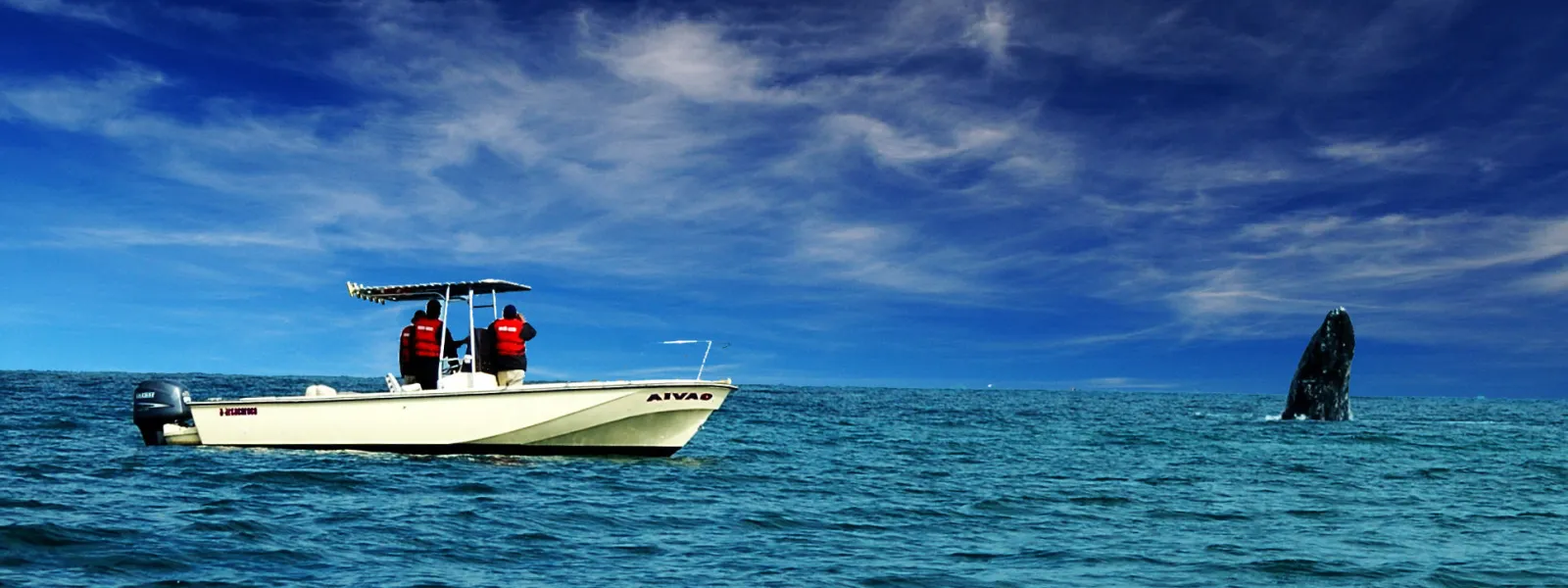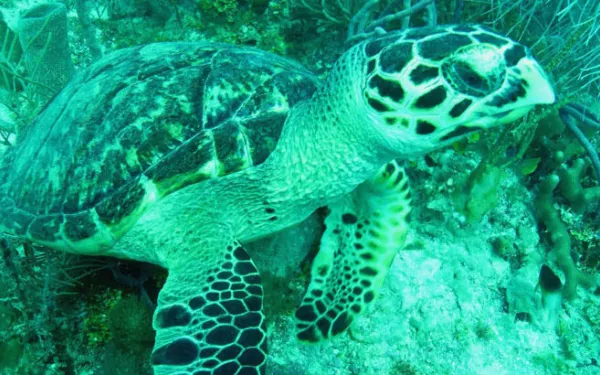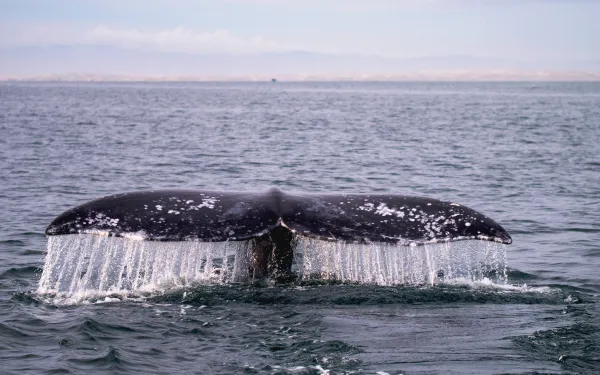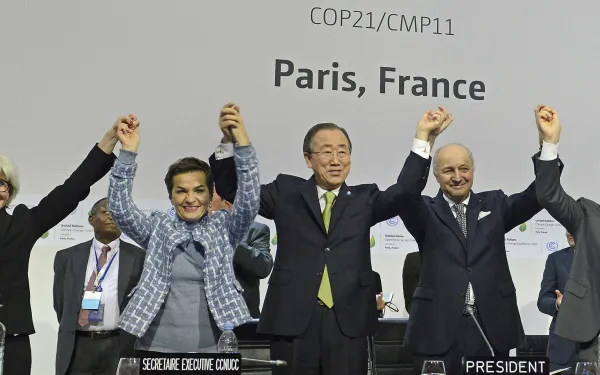
Project
Photo: Paolo MacorigDefending Mexico's marine biodiversity from deep sea mining
Each year, thousands of grey whales arrive to give birth to their young in the shelter of Ulloa Bay in Baja California Sur. It is a key location in the specie’s annual migration.
The rich marine ecosystem is also critical to blue whales, humpback whales and other threatened species, such as the loggerhead turtle, which seek food and shelter in the bay. Additionally, it’s home to species of commercial interest, such as clams, lobsters and shrimp.
But a serious threat looms over Ulloa Bay, and the animals and people who depend on its health. The Don Diego mine is set to extract, over 50 years, 350 million tons of phosphate sand from the seabed, in an area equivalent to 60 percent of Mexico City.
The whales and sea turtles that inhabit or transit the area rely on sound to communicate and find food. Large dredging ships used to extract phosphate sand will generate an enormous buzz, altering the environment in ways that modify marine mammal behavior and even threaten species survival.
Partners:
Related projects

Mexico protects loggerhead turtles from the Don Diego mine
AIDA celebrates SEMARNAT’s decision to deny the environmental authorization of a marine phosphate mine proposed for Ulloa Bay, Baja California Sur. They found the measures the operating company presented to safeguard sea turtles are based on inconsistent information. Mexico City, Mexico. The Secretary of Environment and Natural Resources (SEMARNAT) placed the protection of the loggerhead turtle, a threatened species, above the economic benefit of the Don Diego marine phosphate mine, proposed for Ulloa Bay in Baja California Sur. The environmental authority denied the authorization of the project proposed by Exploraciones Oceánicas after finding that the measures presented by the company for protecting loggerheads are based on inconsistent information. The Interamerican Association for Environmental Defense (AIDA) applauds SEMARNAT’s decision, which states that the economic benefits of the project “cannot prevail over the protection of the natural resources of Ulloa Bay,” especially when some of those, like the loggerhead turtle (Caretta Caretta), “are threatened species subject to strict standards of protection.” According to the Secretariat, it’s not easy to harmonize the safeguarding of sea turtle populations with an activity “that adds to existing anthropogenic pressure (resulting from human activity) in the area and increases the risk of extinction of the species, which is internationally recognized” (pg. 232 of SEMARNAT’s decision). AIDA presented arguments to SEMARNAT about the international obligations that Mexico would breach upon authorizing the project, as well as the insufficient information with which the company evaluated the environmental impact of the mine on marine ecosystems, and on which mitigation measures were based. According to the Secretariat, Exploraciones Oceánicas proposed a program for the monitoring of sea turtles that could better be described as one of “rescue,” which is not based on quantitative data of the loggerhead habitat. In addition, the company did not present prevention and mitigation measures to guarantee the availability of sufficient food, and its model for restoration of the seabed—which it seeks to dredge to extract phosphate—does not take into account the particular characteristics of Ulloa Bay (pgs. 225 and 226). SEMARNAT relied upon international standards to deny Don Diego’s environmental authorization. They drew upon Mexico’s obligations to protect its marine environment and to use the best possible scientific information in the protection of sea turtles, contained, respectively, in the United Nations Convention on the Law of the Sea (CONVEMAR) and the Inter- American Convention for the Protection and Conservation of Sea Turtles (CIT). More information 10 Things You Should Know About Don Diego
Read more
10 Things You Should Know About Don Diego
1. Don Diego is a proposed marine mining project in Mexico. Marine mining is a process used to extract metals or minerals from the seabed. The Don Diego proposal calls for dredging seven million tons of phosphate sand from the seabed 19 kilometers off the coast of Baja California Sur.[1] Leftover materials – excess or waste – that are not of interest would be returned to the sea.[2] 2. If created, it would be the first phosphate mine of its type, using this technique, in the region. This makes it impossible to accurately predict the damage that it could do or the measures that could be taken to protect against it.[3] Other countries, such as Namibia and New Zealand, [4] have rejected similar projects due to the severity of their potential impacts. Exploraciones Oceánicas, the company in charge of the project, does not have adequate experience in this area,[5] nor does the Mexican government have the experience to implement and monitor it properly. Even with this uncertainty, the company has not provided a financial guarantee to ensure compliance with the plan for managing, monitoring and supervising Don Diego. 3. It would alter the marine ecosystem. The collection of phosphate sand from the sea, and the deposition of waste, would create sediment that blocks light from entering, in turn affecting marine photosynthesis.[6] Dredging would destroy the health and habitat of benthic species such as oysters and clams, damaging the food chain and the natural equilibrium of the area.[7] The ecosystem could take years to recover. 4. The mine will not necessarily create greater food security in Mexico. Phosphate is used in fertilizer, which helps to produce food. The project’s proponents say a marine mine is needed to make up for reduced global phosphate reserves on land.[8] But beginning an operation of this type, without necessarily understanding the technique and its impacts, could cause more harm than good. In addition, extracting phosphate from Mexico’s waters does not guarantee that the phosphate will then be used to meet the demands of agriculture in Mexico, or in the Americas at all. 5. It would put at risk fisheries and the families that depend upon them. The location of the mining project would overlap with fishing concessions.[9] Ulloa Bay produces nearly 8,450 tons per year of commercial species including abalone, clams, squid, shrimp, snail, dogfish, crab, lobster, oyters, octopus, sharks and rays.[10] Fisheries would decline considerably due to the impacts of dredging the seabed.[11] 6. It would impact an ecologically rich and vulnerable area. Ulloa Bay is a unique marine region characterized by its biodiversity and high productivity. The bay is home to a great number of species of interest both to fisheries and to conservationists. In addition, a portion of the project would spread over 20 percent of the Magdalena Bay Region of Marine Importance,[12] a mangrove ecosystem that provides essential environmental services to coastal communities, including mitigation of climate change. 7. It would further endanger the habitat of the loggerhead turtle. Ulloa Bay is a critical habitat for the endangered loggerhead turtle, so much so that the Mexican government previously named it a refuge for the protection of the species.[13] Studies show that heavy noise, such as the mine would generate, would cause drastic changes in behavior and displace turtles from their habitat.[14] In addition, the Interamerican Convention for the Protection and Conservation of Sea Turtles has recently included mining as one of the listed activities threatening the health and habitat of sea turtles.[15] 8. It would destroy a refuge for the grey whale. Each year, the grey whale travels from Alaska to the warm waters of Baja California Sur to give birth to and raise its young.[16] Whales use sound to identify and locate their pod, and to find and capture their food.[17] Don Diego would generate noise, increase traffic and change the marine ecosystem, forever altering what has been for centuries a refuge for migrating whales.[18] 9. Approval of the project would involve a breach of international obligations on the part of the Mexican government. Mexico has obligations under international law to protect its marine ecosystem and the vulnerable species that depend on its health. The precautionary principle should be applied to this case, as there is no scientific certainty about the magnitude and intensity of the environmental damage that could occur. The Mexican government is required to take measures to avoid such damage, including evaluating a no-project alternative, until it proves that harm can be avoided or minimized. 10. The details of the project are confusing and available public information is incomplete. The duration and specific location of the project remain unclear. For example, the project is proposed to last 50 years, but under the Mining Law it could be extended 50 additional years.[19] [1] Environmental Impact Assessment, Executive Summary of the project “Dragado de arenas fosfáticas negras en el yacimiento de Don Diego”, pp. 4, 5 y 7. Available in Spanish at: http://apps1.semarnat.gob.mx/dgiraDocs/documentos/bcs/resumenes/2015/03BS2015M0008.pdf [2] Todo el proceso es descrito por el promovente, con mayor énfasis en el Capítulo II de la Manifestación de Impacto Ambiental, pp. 23-42. [3] Rofomex was a phosphate project in San Juan de la Costa, close to the city of La Paz, Baja California; the mine produced two million tons of phosphate annually, information available at http://www.dredge.com/dred2-10.html , http://defiendelasierra.org/wp-content/uploads/San-Juan-de-la-Costa.pdf y http://mrdata.usgs.gov/mrds/show-mrds.php?dep_id=10048963; however, the project was located on land and was not in Ulloa Bay, see the extact location here. [4] The first marine phosphate mine was proposed in Namibia in 2013, however the project was not approved and a moratorium was subsequently announced on this activity. See: http://www.scoop.co.nz/stories/WO1307/S00188/marine-phosphate-mining-cannot-be-sustained-by-namibia.htm and http://www.worldfuturecouncil.org/sandpiper-project.html; New Zealand used the precautionary principle to negate permission of an underwater phosphate mine, see: http://www.stuff.co.nz/business/industries/66038589/Chatham-Rock-Phosphate-aghast-mining-consent-refused [5] Website of Exploraciones Océanicas and activity on the NASDAQ stock exchange, which shows the company has never before undertaken a marine phosphate mining project. [6] The phosphate mining industry is considered of the potential sources of nuclear contamination, stemming from elements like Uranium (238U) and Thorium (232Th). The sediments that would be returned to the sea may contain high levels of toxic chemicals, including the presences of these two elements, which would be exposed during the phosphate separation process. Al-Masri, M., Mamish, S. et al. (2002). “The impact of phosphate loading activities on near marine environment: The Syrian Coast.” Journal of Environmental Radioactivity 58 (2002) 35-44. P. 1. [7] Environmental Impact Assessment, Executive Summary of the project “Dragado de arenas fosfáticas negras en el yacimiento de Don Diego,” Chapter VIII, Table VI.3, p. 64, y Chapter V, p. 48. Available in Spanish at: http://apps1.semarnat.gob.mx/dgiraDocs/documentos/bcs/estudios/2015/03BS2015M0008.pdf [8] U.S Geological Survey, Mineral Commodity Summaries, January 2015. Available at: http://minerals.usgs.gov/minerals/pubs/commodity/phosphate_rock/mcs-2015-phosp.pdf [9] Instituto Nacional de la Pesca Oficio RJL/INAPESACA/DGAIPP/978/2014 [10] CONABIO. Estudio sobre la caracterización socioeconómica y pesquera del Área Golfo de Ulloa, BCS (2010). Available in Spanish at: http://goo.gl/7An5o5 [11] Environmental Impact Assessment, Executive Summary of the project: “Dragado de arenas fosfáticas negras en el yacimiento de Don Diego,” Chapter VIII, Table VI.3, p. 64. Available in Spanish at: http://apps1.semarnat.gob.mx/dgiraDocs/documentos/bcs/estudios/2015/03BS2015M0008.pdf [12] Instituto Nacional de la Pesca. Oficio RJL/INAPESCA/DGAIPP/757/2014 [13] The Agreement that establishes the Area of Refuge for the Loggerhead Turtle (Caretta Caretta) in Ulloa Bay in Baja California Sur was before the Federal Regulatory Improvement Commission to obtain an approving opinion, December 9, 2014. 2014. Available in Spanish at: http://www.cofemermir.gob.mx/mir/crLecAnte.asp?submitid=33808 [14] Convention on Biological Diversity. “Sea turtle hearing and sensitivity to acoustic impacts.” Available at: https://www.cbd.int/doc/meetings/mar/mcbem-2014-01/other/mcbem-2014-01-submission-boem-03-en.pdf, pgs. 3 and 4. [15] Interamerican Convention on the Protection and Conservation of Sea Turtles, Seventh Conference of Parties, June 24-26, 2015, Mexico City. Resolution CIT-COP7-2015-R3. Available at: http://www.iacseaturtle.org/docs/resolucionesCOP7CIT/CIT-COP7-2015-R3_Cabezona_ Resolucion_ESP_7.15.15_ADOPTADA.pdf [16] Guerrero Ruiz, M., Urbán Ramírez, J. y Rojas Bracho, L. 2006. Las ballenas del golfo de California. Secretaría de Medio Ambiente y Recursos Naturales (SEMARNAT). Instituto Nacional de Ecología (INE). 537 pp. [17] Baker C. S. y C. M. Herman. 1984. Aggressive behavior between Humpback whales (Megaptera novaeangliae) wintering in Hawaiian waters. Can. J. Zool. 62(10): 1,922-1,937.; Croll, D. A., C. W. Clark, A. Acevedo, B. R. Tershy, S. Flores, J. Gedamke y J. Urbán. 2002. Only male fin whales sing loud songs. Nature 417: 809. [18] Annex 13 is a three page document that does not support the conclusions of the company in the environmental impact assessment. [19] Environmental Impact Assessment, Executive Summary of the project “Dragado de arenas fosfáticas negras en el yacimiento de Don Diego,” Chapter II, p. 4. Available in Spanish at: http://apps1.semarnat.gob.mx/dgiraDocs/documentos/bcs/estudios/2015/03BS2015M0008.pdf
Read more
AIDA statement on the signing of the Paris Accord
AIDA celebrates the first step toward the construction of a new planet. New York, USA. Today, on Earth Day, in the headquarters of the United Nations, the Paris Agreement opens for signatures. The signing of the accord by Member States of the UN Framework Convention on Climate Change is necessary to enable the treaty to quickly enter into force. The agreement lays out actions the world must implement to tackle climate change, the greatest threat humanity faces. The following is a statement by AIDA co-directors Astrid Puentes Riaño and Anna Cederstav: “Today we celebrate the historic signing of the Paris Agreement, a vital step and a new beginning in humanity’s efforts to tackle climate change. This accord, and its immediate signing and ratification by all nations, brings hope to our planet and for future generations. We recognize that the Agreement is not perfect, but we understand the complexity of nearly 200 countries reaching consensus on sensitive issues. The agreement is therefore a critical first step on the path toward ambitious and effective results. One of the Agreement’s noteworthy advances is the recognition that all climate actions must take into account and respect human rights and the rights of indigenous peoples, while also ensuring gender and intergenerational equality and a just transition of the workforce. The Agreement also recognizes the large gap that exists between the commitments made by States and the urgent measures needed to avoid catastrophic consequences, including the need for increased climate finance. We therefore hope that the celebration, speeches and official photographs will translate into prompt and effective action that goes beyond the agreements made in Paris last December. The Paris Agreement reflects a paradigm shift that is both necessary and possible. For Latin America and the Caribbean, highly affected and vulnerable regions, the Agreement presents a unique opportunity to achieve low-carbon development that prioritizes the protection of communities, people and ecosystems. AIDA has participated in the climate negotiations for many years as a Latin American voice. It makes us proud that our efforts, alongside those of the countless people and organizations with whom we’ve worked, have come to bear fruit. The signing of the Agreement today commits us to continuing our work to ensure compliance. Responding to climate change is everybody’s job, considering differentiated capabilities and responsibilities. States have an obligation to sign, ratify and immediately implement the Paris Agreement. International organizations, financial institutions and corporations must acknowledge their responsibility. And we, as individuals, must all examine our personal actions and how we can contribute to reducing climate change. Each and every contribution is essential to the adoption of real solutions that lead the way to a more just and sustainable world. The signing of the Paris Agreement today evidences important political will that must be translated, without delay, into concrete results. The most vulnerable and most severely affected countries cannot wait.”
Read more